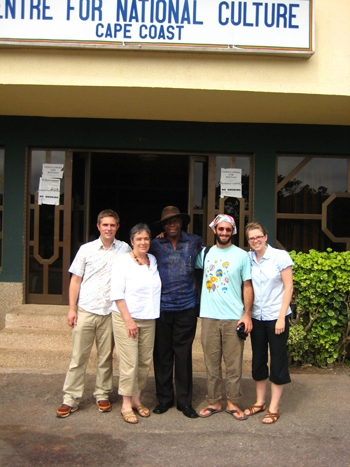Documents:
10 Things You Can Do To Care for Your Film, Video, and Audiotape
10 Things You Can Do to Care for Your Digital Video Works
Reel Life Archiving Workshop Presentation
REAL LIFE ARCHIVING: RESOURCES AND BIBLIOGRAPHY
Images from APEX: GHANA, June 2008
From June 2-20, 2008, three members of the NYU's Moving Image Archiving and Preservation (MIAP) Program — Associate Professor Mona Jimenez, Adjunct Professor Chris Lacinak, and Senior Research Fellow Kara Van Malssen — had the extraordinary opportunity to visit Ghana, West Africa, in the interest of archiving and preservation. The visit was made possible by a Global Fellowship awarded to Jimenez through NYU's Office of Global Programs, and was planned in consultation with NYU Associate Professor Awam Amkpa (Drama, Africana Studies), who is the Academic Director of NYU in Ghana. The first project of MIAP's new international outreach program Audiovisual Preservation Exchange (APEX), the team's activities were multi–faceted and focused on Ghana's moving image and sound heritage.

From left to Right: Chris Lacinak, Mona Jimenez, Mr. Kwame Sarpong, Seth Paris, Kara Van Malssen
The visit was planned to coincide with the 3rd annual Real Life Documentary Film Festival organized by Amkpa and filmmaker/journalist Lydie Diakhate. The Festival highlights short and feature length documentaries by filmmakers representing Africa and the African Diaspora. Jimenez and Van Malssen conducted a workshop "Real Life Archiving" at the Festival to an audience of both filmmakers and members of the film and television community in Accra.
Jimenez also participated in a panel discussion "Archiving and Cultural Advocacy" with some of Ghana's most prominent film and television professionals, including filmmaker Kwaw Ansah, Founder and Director of TV Africa; Rev. Dr. Chris Hesse, President of the Ghana Academy for Film and Television Arts; and Oscar Nchor, Director of Technical Programs, Ghana Broadcasting Corporation.
The team set to work to meet and discuss issues of archiving and preservation with repositories in Accra and Cape Coast, exploring ideas for possible collaborative projects with NYU in Ghana and MIAP. The team researched and visited the archives and libraries of cultural institutions that hold rich collections of sound and moving images from throughout Ghana's history. In Accra, the team visited the Ghana Broadcasting Corporation, the National Film and Television Institute, the Cinema Department of Information Services (part of the Ministry of Information), and TV Africa. The team also traveled to Cape Coast to meet with Mr. Kwame Sarpong, Director of the Gramophone Records Museum and Research Center of Ghana.
The APEX team also worked intensively in support of Fulbright Scholar Seth Paris's work preserving the fragile recordings of music legend Kofi Ghanaba (Guy Warren). Paris had worked during the preceding months organizing and cataloging Ghanaba's holdings and digitizing audiocassettes as part of the African Expressive Culture Project of Africa House in association with the Department of Africana Studies. Assisted by Paris, Lacinak performed an assessment of the audio collection and installed an audio digitization lab at the NYU in Ghana Academic Center. The lab is capable of preserving content housed on audio open reel, audiocassette and analog discs. The Ghanaba collection serves as a pilot project for the audio digitization lab; the goal is to establish ongoing capability as a resource for preserving Ghana's audio heritage. In support of the current and ongoing efforts of the audio lab, the APEX team began developing and documenting preservation workflows, metadata specifications and training materials.
The team also conducted audio interviews with Mr. Kwame Sarpong, Rev. Dr. Chris Hesse (who also was the former Managing Director of the Ghana Film Industry Corporation and a cameraman since the colonial years); and Mr. Joe Nkrumah, Professor for NYU in Ghana and recently retired Conservator of the National Museums and Monuments Board in Accra.
As a result of these visits and interviews, the APEX team was able to gain a great deal of insight into the state of Ghana's audiovisual archives and opportunities for collaborations that will lead to greater access to historical materials for teaching, scholarship and public programming. In the interest of continued growth and progress on this front, APEX is continuing to develop these relationships, is researching scholarship and funding opportunities for professionals in Ghana, and with colleagues in Africana Studies, is discussing both future training seminars and internship/research opportunities for MIAP students.